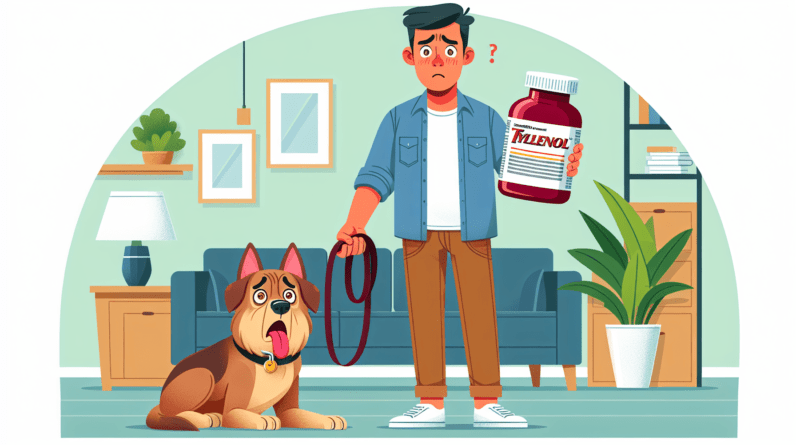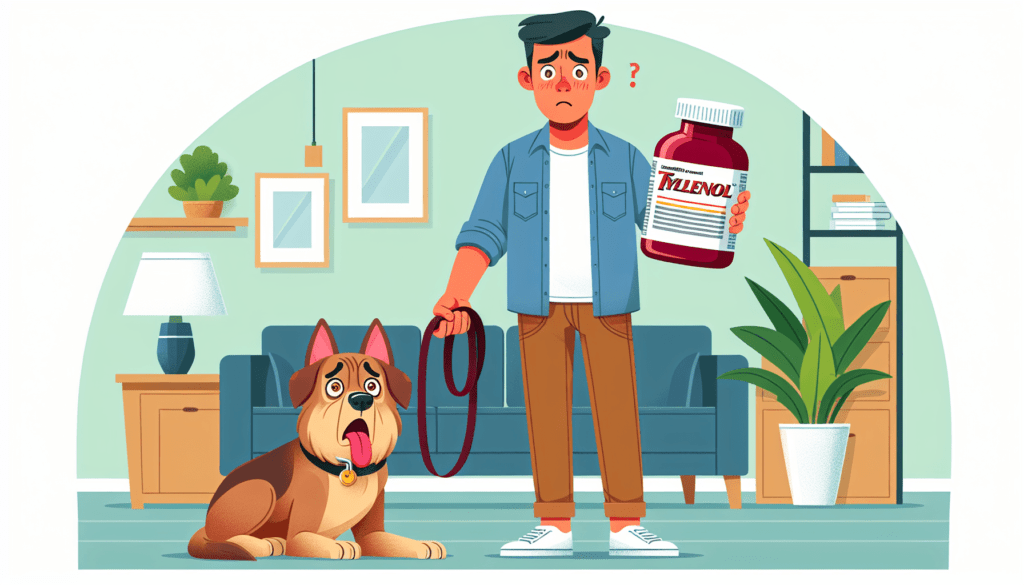
When it comes to the well-being of our furry friends, we want to make sure we are making the right choices. One common question that often arises is whether or not it is safe to give Tylenol to dogs. As responsible pet owners, it is crucial to understand the potential risks and consult with a trusted veterinarian before administering any medication. By prioritizing the health and safety of our pets and seeking professional advice, we can ensure that our beloved companions lead vibrant and joyful lives by our sides. So, is Tylenol okay for dogs? Let’s find out.
Understanding Tylenol
What is Tylenol?
Tylenol, also known by its generic name acetaminophen, is a popular over-the-counter pain reliever and fever reducer. It belongs to a class of medications called analgesics, which work by blocking pain signals in the brain. Tylenol is commonly used to alleviate mild to moderate pain, reduce fever, and manage various conditions in humans.
How does Tylenol work?
Tylenol works by inhibiting the production of certain chemicals in the body, known as prostaglandins, which are responsible for causing pain and fever. By reducing the levels of prostaglandins, Tylenol can help relieve discomfort and lower body temperature in humans.
Is Tylenol safe for humans?
When used as directed and within recommended dosage limits, Tylenol is generally considered safe for humans. However, it is important to follow the instructions and consult a healthcare professional if you have any concerns or underlying health conditions. It is particularly vital to avoid exceeding the recommended dosage, as excessive consumption of Tylenol can lead to serious health problems, including liver damage.
Why is Tylenol harmful to dogs?
While Tylenol may be a popular choice for humans, it is important to understand that Tylenol can be extremely harmful to dogs. The active ingredient in Tylenol, acetaminophen, can cause severe toxicity in dogs due to their unique metabolism. Dogs lack a specific enzyme needed to process acetaminophen effectively, which can lead to serious consequences when ingested.
Effects of Tylenol on Dogs
Toxicity symptoms in dogs
When dogs ingest Tylenol, it can have a detrimental impact on their health. Some common symptoms of Tylenol toxicity in dogs include difficulty breathing, weakness, vomiting, loss of appetite, jaundice, and pale gums. These symptoms can occur within hours of ingestion and should never be ignored.
Damage to the liver and kidneys
Tylenol toxicity in dogs can cause major damage to their liver and kidneys. This can lead to liver failure, kidney failure, and even death if not promptly addressed. Dogs are more susceptible to liver damage from acetaminophen compared to humans, making it essential to prevent any exposure to Tylenol.

Anemia in dogs
Another serious effect of Tylenol on dogs is the potential to induce anemia. This occurs as a result of the drug’s impact on red blood cells, which are responsible for transporting oxygen throughout the body. Anemia can lead to weakness, fatigue, pale gums, and other concerning symptoms in dogs.
Other potential side effects
In addition to the aforementioned effects, Tylenol can also cause gastrointestinal issues in dogs, such as stomach ulcers and bleeding. It can also adversely affect the cardiovascular system, leading to rapid heart rate, irregular heartbeat, and even cardiac arrest in severe cases. These side effects underscore the importance of keeping Tylenol away from dogs.
Alternative Pain Medications for Dogs
Safe pain relievers for dogs
When it comes to managing pain in dogs, there are alternative medications that are safe and specifically designed for their needs. Non-steroidal anti-inflammatory drugs (NSAIDs) such as carprofen and meloxicam are commonly prescribed by veterinarians to alleviate pain and inflammation in dogs. These medications have been extensively studied and are considered much safer for dogs than Tylenol.
Prescription medication options
In some cases, your veterinarian may prescribe stronger pain medications for your dog if necessary. These medications may include opioids like tramadol, which can provide effective pain relief for dogs under veterinary supervision. It is crucial to remember that any pain medication should only be administered under the guidance of a professional veterinarian.
Natural remedies for pain management
In addition to traditional medications, there are also natural remedies that can help manage pain in dogs. These include supplements like glucosamine and chondroitin, which can support joint health and alleviate discomfort associated with arthritis. Additionally, alternative therapies such as acupuncture or physical therapy may provide pain relief for dogs in certain situations. Consulting with a veterinarian can aid in determining the most suitable natural remedies for your dog’s specific needs.
Consulting with a Veterinarian
Importance of veterinary consultation
When your dog is in pain, it is crucial to consult with a veterinarian before administering any medication. Veterinary professionals have the expertise to diagnose the underlying cause of your dog’s pain and recommend appropriate treatment options. Additionally, they can provide guidance on the safe and effective use of pain medications specific to your dog’s breed, size, and health condition.

Steps to take when your dog is in pain
If you suspect that your dog is in pain, it is essential to observe their behavior closely and look for any indications of discomfort. Contact your veterinarian as soon as possible to schedule an appointment and discuss your dog’s symptoms. Your veterinarian may conduct a physical examination, perform diagnostic tests if necessary, and recommend appropriate pain management strategies.
Avoiding self-medication for dogs
While it may be tempting to reach for over-the-counter medications to alleviate your dog’s pain, self-medication should always be avoided. Each dog is unique, and certain medications that may be safe for humans can prove toxic to dogs. Consulting with a veterinarian ensures that your dog receives proper care and avoids any potential harm associated with inappropriate medications.
Cautionary Measures
Storage and disposal of medications
To prevent accidental ingestion, it is important to store all medications, including Tylenol, in a secure location that is inaccessible to your pets. Keep them in cabinets or drawers that are properly sealed. It is equally important to dispose of any unused or expired medications properly. Follow local guidelines for safe medication disposal or consult your veterinarian for guidance.
Recognizing accidental Tylenol ingestion
If you suspect that your dog may have accidentally ingested Tylenol, it is crucial to be vigilant and watch for any signs of poisoning. Look for symptoms such as vomiting, diarrhea, abdominal pain, breathing difficulties, and behavioral changes. If you notice any of these signs, contact your veterinarian immediately for guidance.
Emergency steps for Tylenol poisoning
In the event of a suspected Tylenol poisoning, time is of the essence. Every second counts in ensuring the best possible outcome for your dog. Contact your veterinarian or a local emergency veterinary clinic immediately for guidance on immediate steps to take. They will provide you with specific instructions based on your dog’s condition and may advise bringing your dog in for immediate medical attention.
Preventing Accidental Exposure
Keeping medications out of reach
One of the most effective ways to prevent accidental exposure to Tylenol or any other medication is to keep them out of your dog’s reach. Store medications in secure cabinets or drawers, preferably in high or locked locations. Additionally, be cautious when taking medication or counting pills, ensuring that none fall within your dog’s reach.
Educating household members and visitors
It is vital to educate all household members, as well as any visitors, about the potential dangers of Tylenol and the importance of keeping it away from dogs. Make sure everyone understands the risks and the importance of consulting a veterinarian before giving any medication to a dog. By spreading awareness, you can help create a safe environment for your furry friend.
Safe pet-sitting and boarding practices
If you need to leave your dog under the care of someone else, such as a pet-sitter or a boarding facility, it is crucial to provide clear instructions regarding medication administration. Ensure that all medications are properly labeled and stored securely, and communicate any specific concerns about your dog’s health to the caretaker. Regular communication and verification of medication procedures can prevent accidental exposure to substances like Tylenol.
Frequently Asked Questions
Can a small dose of Tylenol be given to a dog?
No, Tylenol should never be given to a dog without veterinary approval. Even small doses of Tylenol can lead to severe toxicity and potentially fatal consequences in dogs. It is crucial to consult with a veterinarian before administering any medication to your dog.
What should I do if my dog accidentally ingests Tylenol?
If you suspect that your dog has ingested Tylenol, it is essential to contact your veterinarian or a local emergency veterinary clinic immediately. They will provide guidance on the appropriate steps to take based on your dog’s condition and may recommend bringing your dog in for immediate medical evaluation.
Are there any safe over-the-counter pain relievers for dogs?
While there are certain over-the-counter pain relievers formulated specifically for dogs, it is always best to consult with a veterinarian before administering any medication. They can recommend the most suitable options based on your dog’s health condition and specific needs.
Can I give my dog Tylenol if a veterinarian approves?
As a rule of thumb, Tylenol should generally not be given to dogs even under veterinary approval. There are safer and more effective pain management options available that are specifically designed for dogs. It is crucial to follow the guidance of a veterinarian and use appropriate medications when necessary.
Conclusion
Prioritizing your dog’s safety and well-being is of utmost importance when it comes to managing their pain. While Tylenol may be safe for humans, it can cause severe toxicity and potential harm in dogs. Consulting with a trusted veterinarian is crucial for proper pain management, as they can recommend safe and effective alternatives. Remember, your pet relies on you to make informed decisions about their healthcare, so always seek professional advice and avoid using Tylenol without veterinary guidance. By doing so, you can ensure your furry companion maintains a healthy and happy life by your side.










